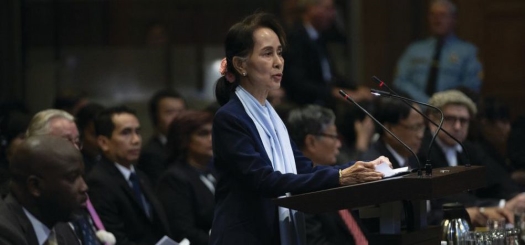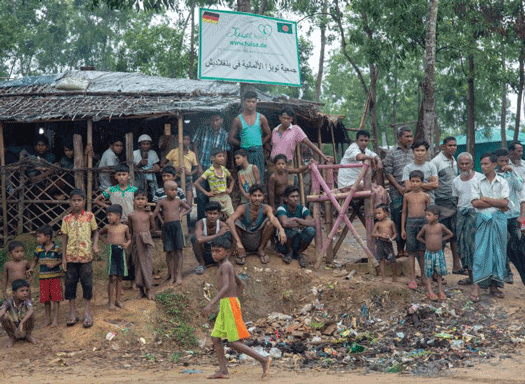Myanmar-Muslim minority a step closer to justice but fight not over
By Brian E. Muhammad -Contributing Writer- | Last updated: Jan 29, 2020 - 10:34:26 AMWhat's your opinion on this article?

In this Dec. 11, 2019 file photo, Myanmar’s leader Aung San Suu Kyi addresses judges of the International Court of Justice for the second day of three days of hearings in The Hague, Netherlands. The United Nations’ highest court is set to rule, Jan. 23, on whether to order Myanmar to halt what has been described as a genocidal campaign against the country’s Rohingya Muslim minority. The International Court of Justice decision comes in a case brought by the African nation of Gambia on behalf of an organization of Muslim nations that accuses Myanmar of genocide in its crackdown on the Rohingya.
|
Judges at the court of International Criminal Justice at the Hague handed down a legal blow on Jan. 23 to the Southeast Asia nation of Myanmar based on a lawsuit over accusations of genocide against its ethnic and Muslim minority Rohingya population during domestic unrest in October 2016 and again in August 2017. The ruling ordered Myanmar to take all measures within its power to prevent the commission of acts of genocide in relation to members of the Rohingya group, alongside several other provisional measures.
The lawsuit was filed by the West African nation of The Gambia in support of the Rohingya people. The suit concerned acts allegedly adopted, taken and condoned by Myanmar’s government against the Rohingya who primarily reside in Myanmar’s Rakhine State. Human rights experts say the unanimous decision is significant in the conflict that has gripped the country. “It’s a major step forward, it’s not a final judgement. That won’t come until years from now,” said Simon Adams, executive director of the Global Centre for the Responsibility to Protect. “This is the equivalency of an injunction or of a restraining order,” he said.
Akila Radha krishnan, president of the Global Justice Center, told The Final Call in a telephone interview that the decision is important in a couple of ways. It recognizes the Rohingya are a group that exists in a situation of serious risk to their existence and more must be done to protect them. It’s also a reminder for Myanmar to be conscientious about their actions.
“They’ve been existing in a space of impunity … for generations,” Ms. Radhakrishnan said. “They’ve also engaged in mass human rights violations across ethnic groups for decades,” she added. Ms. Radhakrishnan believes the ruling is a turning point and “clear indicator that the cycle of impunity” for Myanmar is being broken.
Mr. Adams explained the order basically says the evidence that Myanmar is carrying out genocide is strong enough and the court is ordering them to stop the acts, preserve evidence of past acts and report to the court every six months on their progress toward solving the situation.

Rohingya refugees in the Kutupalong Rohingya Refugee Camp in Cox’s Bazar , July 2, 2018.
|
“It’s a massive defeat for Myanmar … a significant victory for Gambia and most of all it’s a huge victory for the Rohingya,” he said.
In November 2019, Abubacarr Tambadou, The Gambia minister of justice, filed the suit against Myanmar at the International Criminal Justice for violating the Genocide Convention. The order demands the prevention of such violations while the court continues to deliberate on the charge.
In response, Myanmar’s Ministry of Foreign Affairs issued a Jan. 23 statement saying based on a domestic investigation, “war crimes had occurred,” however, “there has been no genocide in Rakhine.” “Those are now being investigated and prosecuted by Myanmar’s national criminal justice system,” said the statement.
The International Criminal Justice is the principle judicial organ of the United Nations. Observers have long maintained that Myanmar’s defense forces should be held legally accountable for a range of abuses against the Myanmar people. During the turmoil the military imposed area “clearance operations” against the Rohingyas in Rakhine State. More than 700,000 Rohingya Muslims fled to neighboring Bangladesh while thousands including children were killed.
This prompted calls for Myanmar to be brought before an international court and charged with crimes against humanity, ethnic cleansing and genocide, which the government denied. Days before the recent ruling Myanmar issued an “executive summary” of a government investigation which characterizes the mass killings as a “haphazard” response by the military to attacks by Muslim militants.
Some observers dismissed the release as an attempt to clear the authorities of any “intent,” which is central to defining the crime of genocide. In December during oral arguments before the court, Myanmar’s Foreign Minister Aung San Suu Kyi downplayed the military’s role by describing the violence as an “internal armed conflict triggered by Rohingya militant attacks.” She also reasoned that her government’s domestic inquiry should cancel the need for international intervention. Ms. Suu Kyi, a previous Nobel Prize winner has come under heavy criticism for how she has dealt with this issue.
The judges rejected her government’s claim while ruling Jan. 23, saying the steps aren’t “sufficient in themselves” to remove the possibility of violations occurring again that will cause irreparable harm against protection of the Rohingya still in Myanmar.
“The Myanmar government must end policies and practices of persecution, apartheid and discrimination against Rohingya stated Wai Wai Nu, a Rohingya lawyer and former Myanmar political prisoner via email to The Final Call.
“Only an international court can hold these perpetrators accountable,” she said. “Rohingya must be allowed to return safely and with all rights restored.” Ms. Nu said the UN and world community must enforce the provisional measures to protect against further genocide.
“The teeth of the system in this context is the UN Security Council,” added Ms. Radhakrishnan.
The measures are automatically transmitted to the Security Council which means they can act to help with compliance. Ms. Radhakrishnan pointed out the “reporting requirement” where Myanmar has to give periodic reports to the International Criminal Justice every six months is an important method of enforcement.
“What you’re doing is you’re setting up a process through the Court where they’re paying attention and the Security council as the enforcement arm needs to be paying attention,” said Ms. Radhakrishnan.
INSIDE STORIES AND REVIEWS
-
-
About Harriett ... and the Negro Hollywood Road Show
By Rabiah Muhammad, Guest Columnist » Full Story -
Skepticism greets Jay-Z, NFL talk of inspiring change
By Bryan 18X Crawford and Richard B. Muhammad The Final Call Newspaper @TheFinalCall » Full Story -
The painful problem of Black girls and suicide
By Charlene Muhammad -National Correspondent- » Full Story -
Exploitation of Innocence - Report: Perceptions, policies hurting Black girls
By Charlene Muhammad -National Correspondent- » Full Story -
Big Ballin: Big ideas fuel a father’s Big Baller Brand and brash business sense
By Bryan Crawford -Contributing Writer- » Full Story






 Click Here Stay Connected!
Click Here Stay Connected!








